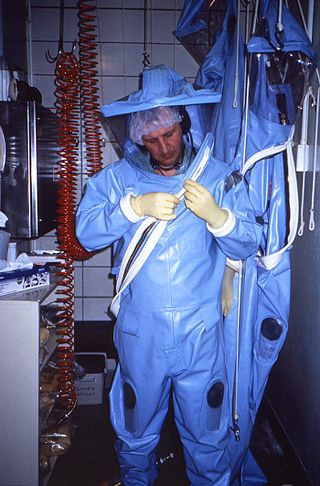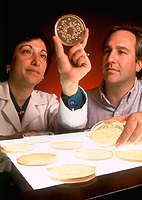
A chemist is a graduated scientist trained in the study of chemistry, or an officially enrolled student in the field. Chemists study the composition of matter and its properties. Chemists carefully describe the properties they study in terms of quantities, with detail on the level of molecules and their component atoms. Chemists carefully measure substance proportions, chemical reaction rates, and other chemical properties. In Commonwealth English, pharmacists are often called chemists.
A film crew is a group of people, hired by a production company, for the purpose of producing a film or motion picture. The crew is distinguished from the cast, as the cast are understood to be the actors who appear in front of the camera or provide voices for characters in the film. The crew is also separate from the producers, as the producers are the ones who own a portion of either the film studio or the film's intellectual property rights. A film crew is divided into different departments, each of which specializes in a specific aspect of the production. Film crew positions have evolved over the years, spurred by technological change, but many traditional jobs date from the early 20th century and are common across jurisdictions and filmmaking cultures.
Lawrence Livermore National Laboratory (LLNL) is a federally funded research and development center in Livermore, California, United States. Originally established in 1952, the laboratory now is sponsored by the United States Department of Energy and administered privately by Lawrence Livermore National Security, LLC.

Biosafety is the prevention of large-scale loss of biological integrity, focusing both on ecology and human health. These prevention mechanisms include the conduction of regular reviews of biosafety in laboratory settings, as well as strict guidelines to follow. Biosafety is used to protect from harmful incidents. Many laboratories handling biohazards employ an ongoing risk management assessment and enforcement process for biosafety. Failures to follow such protocols can lead to increased risk of exposure to biohazards or pathogens. Human error and poor technique contribute to unnecessary exposure and compromise the best safeguards set into place for protection.

A laboratory is a facility that provides controlled conditions in which scientific or technological research, experiments, and measurement may be performed. Laboratories are found in a variety of settings such as schools, universities, privately owned research institutions, corporate research and testing facilities, government regulatory and forensic investigation centers, physicians' offices, clinics, hospitals, regional and national referral centers, and even occasionally personal residences.
A dietitian, medical dietitian, or dietician is an expert in identifying and treating disease-related malnutrition and in conducting medical nutrition therapy, for example designing an enteral tube feeding regimen or mitigating the effects of cancer cachexia. Many dietitians work in hospitals and usually see specific patients where a nutritional assessment and intervention has been requested by a doctor or nurse, for example if a patient has lost their ability to swallow or requires artificial nutrition due to intestinal failure. Dietitians are regulated healthcare professionals licensed to assess, diagnose, and treat such problems. In the United Kingdom, dietitian is a 'protected title', meaning identifying yourself as a dietitian without appropriate education and registration is prohibited by law.

Professional diving is underwater diving where the divers are paid for their work. Occupational diving has a similar meaning and applications. The procedures are often regulated by legislation and codes of practice as it is an inherently hazardous occupation and the diver works as a member of a team. Due to the dangerous nature of some professional diving operations, specialized equipment such as an on-site hyperbaric chamber and diver-to-surface communication system is often required by law, and the mode of diving for some applications may be regulated.

A microbiologist is a scientist who studies microscopic life forms and processes. This includes study of the growth, interactions and characteristics of microscopic organisms such as bacteria, algae, fungi, and some types of parasites and their vectors. Most microbiologists work in offices and/or research facilities, both in private biotechnology companies and in academia. Most microbiologists specialize in a given topic within microbiology such as bacteriology, parasitology, virology, or immunology.

A supervisor, or lead, is the job title of a lower-level management position and role that is primarily based on authority over workers or a workplace. A supervisor can also be one of the most senior on the employees at a place of work, such as a professor who oversees a Ph.D. dissertation. Supervision, on the other hand, can be performed by people without this formal title, for example by parents. The term supervisor itself can be used to refer to any personnel who have this task as part of their job description.

A Medical Laboratory Scientist (MLS) or Clinical Laboratory Scientist (CLS) or Medical Technologist (MT) is a licensed Healthcare professional who performs diagnostic testing of body fluids, blood and other body tissue. The Medical Technologist is tasked with releasing the patient results to aid in further treatment. The scope of a medical laboratory scientist's work begins with the receipt of patient or client specimens and finishes with the delivery of test results to physicians and other healthcare providers. The utility of clinical diagnostic testing relies squarely on the validity of test methodology. To this end, much of the work done by medical laboratory scientists involves ensuring specimen quality, interpreting test results, data-logging, testing control products, performing calibration, maintenance, validation, and troubleshooting of instrumentation as well as performing statistical analyses to verify the accuracy and repeatability of testing. Medical laboratory scientists may also assist healthcare providers with test selection and specimen collection and are responsible for prompt verbal delivery of critical lab results. Medical Laboratory Scientists in healthcare settings also play an important role in clinical diagnosis. An estimated 70% of medical decisions are based on laboratory test results and MLS contributions affect 95% of a health system's costs.

Chemical technologists and technicians are workers who provide technical support or services in chemical-related fields. They may work under direct supervision or may work independently, depending on their specific position and duties. Their work environments differ widely and include, but are not limited to, laboratories and industrial settings. As such, it is nearly impossible to generalize the duties of chem techs as their individual jobs vary greatly. Biochemical techs often do similar work in biochemistry.
In 1957, the research organization of the Chemicals Department of E. I. du Pont de Nemours and Company was renamed Central Research Department, beginning the history of the premier scientific organization within DuPont and one of the foremost industrial laboratories devoted to basic science. Located primarily at the DuPont Experimental Station and Chestnut Run, in Wilmington, Delaware, it expanded to include laboratories in Geneva, Switzerland, Seoul, South Korea, Shanghai, China, and India (Hyderabad). In January, 2016 a major layoff marked the end of the organization.

A medical laboratory or clinical laboratory is a laboratory where tests are conducted out on clinical specimens to obtain information about the health of a patient to aid in diagnosis, treatment, and prevention of disease. Clinical medical laboratories are an example of applied science, as opposed to research laboratories that focus on basic science, such as found in some academic institutions.

Miriam Rodón Naveira is an environmental scientist from San Juan, Puerto Rico, working at the federal government of the United States for which she was awarded a Silver Medal for Superior Service and a Suzanne Olive EEO and Diversity Award both by the EPA. She was also the first Hispanic woman to serve as branch chief of the EPA's National Exposure Research Laboratory (NERL) and later the first Hispanic woman to become deputy director of NERL's Environmental Sciences Division. Working at NASA since 2000, she now oversees research to enhance collaboration within DFRC, as well as with external entities, in support of the integrated use of remote sensing instruments in aerial platforms.

SymbioticA is an artistic research lab at the University of Western Australia's School of Anatomy and Human Biology. The lab looks at biology and the life sciences from an artistic point of view and has been used to research, develop and execute a number of contemporary art & science and bioart projects.
Academic ranks in Russia are the conferred titles, indicating relative importance and power of professors, researchers, and administrative personnel in Russian academia and scientific institutions. The rank “certifies” the demonstrated ability of an individual to function in the specific academic position(s).
Gangadhar J. Sanjayan is an Indian bioorganic chemist, scientist and the head of The Sanjayan Lab at the National Chemical Laboratory, Pune. He is known for his researches on the synthesis of designer peptide/protein mimetics and hetero-foldamers and is a recipient of the Bronze Medal of the Chemical Research Society of India. The Council of Scientific and Industrial Research, the apex agency of the Government of India for scientific research, awarded him the Shanti Swarup Bhatnagar Prize for Science and Technology, one of the highest Indian science awards, in 2012, for his contributions to chemical sciences.

A laboratory technician is a person who works in a laboratory performing analytical or experimental procedures, maintaining laboratory equipment.
The Standard Occupational Classification, often abbreviated as the SOC, is the system used by the United Kingdom's Office for National Statistics (ONS) to classify people for statistical purposes according to their job. Under this system, a job is defined as "a set of tasks or duties to be carried out by one person". The SOC classifies jobs according to the level and specialisation of skill. The SOC was introduced in 1990. It has undergone several revisions; the latest, SOC 2020, includes nine major groups of occupations, each broken down into smaller units: there are 26 sub-major groups, 104 minor groups and 412 unit groups. The groups are designed to be as similar as possible to the International Standard Classification of Occupations 2008.











